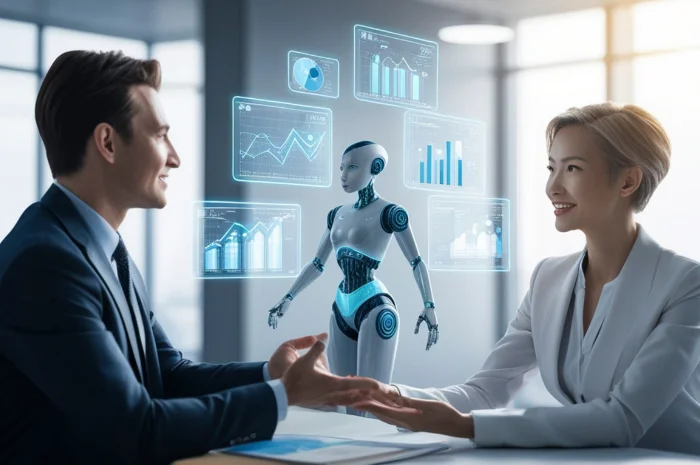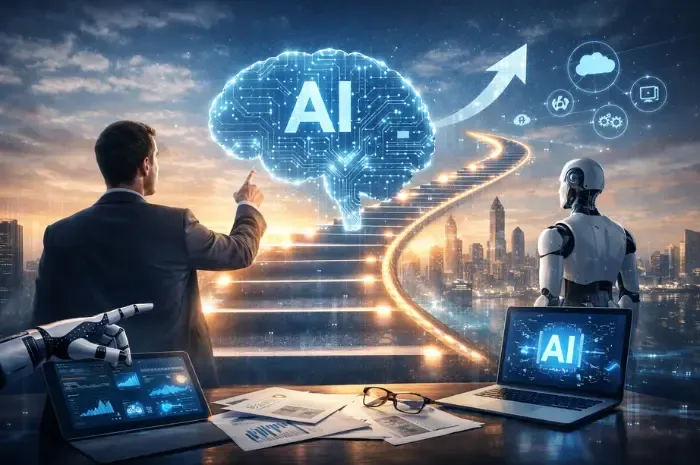Now, flash forward to 2025. You are met with a chatbot on your screen, calendar invites are managed by virtual assistants, and reports are created by software before lunch. Welcome to a world where AI agents are performing tasks once performed by humans. It is exciting, but it sure leaves one wondering: Will AI agents replace human workers?
What Are the Primary Responsibilities of an AI Agent?

AI agents are intelligent digital employees driven by sophisticated algorithms and machine learning. They do not suit up or take coffee breaks, but they do know how to get the job done. Here is what they usually work on:
1. Customer Support Like Never Before
Gone are the days of waiting for hours on the call. Now, AI agents such as voice assistants and chatbots can deal with a thousand inquiries at the same time. Whether it is following up on an order, changing a password, or suggesting products, they do it all within seconds, usually in a tone that resembles a human’s.
2. Handling Data Like a Pro
From spreadsheets to dashboards, AI can pick, analyze, and interpret vast quantities of data quicker than any human. Such agents can detect trends, flag anomalies, and even recommend actionable insights. What previously took analysts days to accomplish, AI is now capable of doing in minutes.
3. Intelligent Scheduling & Time Management
AI personal assistants now take care of your meetings, remind you, block out your calendar, and even suggest when to hold a team call based on everyone’s availability. AI personal assistants are doing it all, no pens, no paper, just productivity.
4. Content Creation & Communication
From responding to emails to creating blog drafts or ad copies, AI is helping content creators in every industry. ChatGPT, Jasper, and Copy.ai are already being used by marketers, teachers, and even reporters.
5. Predicting the Future
In finance, health, retail, and even agriculture, AI agents are employed to foresee results. Whether forecasting sales, early disease diagnosis, or weather analysis for more effective farm planning, AI is shaping business operations.
Will AI Agents Replace Jobs?

Let’s not beat around the bush- some work will be automated, particularly the repetitive, rule-based kind. Data entry, simple customer inquiries, appointment bookings, and even certain accounting tasks are already done by machines.
Our Chief AI Officer tackled this very concern in his latest podcast, “Will AI Take Our Jobs, Data, and Future? A Deep Dive into the AI Revolution.” He offered eye-opening insights into which roles are most at risk, and more importantly, how the workplace is evolving.
The good news? Work that involves emotional intelligence, subtle judgment, creativity, and moral judgment remains firmly in human hands. For instance:
- A counsellor’s compassion cannot be programmed.
- A teacher’s inspiration is more than textbooks.
- No matter how advanced, AI will not mimic the intuition that drives great marketing strategy.
In communication and business, where emotions, context, and cultural awareness are essential, AI still has much to learn before it can fully replace humans.
So, instead of worrying about job loss, job transformation should be the concern. The future employee will work alongside AI, not against it.
Can AI Agents be Trusted?

As AI becomes more integrated into our work, it is natural to wonder: Can we truly trust AI agents, especially when it comes to handling sensitive tasks? While AI brings efficiency and accuracy, there are valid concerns around its reliability and judgment. Before we delegate critical tasks to AI, it is important to recognize its limitations and the risks that come with it.
Let’s break it down:
1. They Rely on Data
AI’s smartness reflects the data behind it. When data is incomplete, outdated, or biased, the AI’s results will mirror those flaws. This is a real concern, especially in sensitive areas like hiring, law enforcement, or healthcare.
2. They Can be Biased
There have been situations where AI systems reflected gender and racial prejudice. They do not occur naturally; these biases arise when humans train them on biased data sets. Human supervision, therefore, becomes extremely important.
3. They Lack a Moral Compass
AI agents lack human values and understanding of consequences. They might execute instructions flawlessly, but in those fuzzy areas of morality, they are unable to distinguish right from wrong as we do.
Of course, with proper control, frequent audits, and ongoing learning, AI agents can be relied upon to execute well-defined, non-critical tasks with efficiency.
What to Do About It?

Instead of asking “Will AI replace my job?”, the right question is, “How can I collaborate with AI to perform my job better?”
- Upskill Yourself
Stay ahead in your field by learning how to effectively use AI tools that are relevant to your work. Whether you are in marketing, design, data analysis, or any other field, mastering AI technologies will make you more efficient, help you solve problems faster, and open new possibilities for innovation.
- Stay Creative
Even as AI becomes more advanced, human creativity, empathy, and leadership remain irreplaceable. Continue to nurture these uniquely human qualities to stand out in a tech-driven world. Your ability to think creatively, connect with others emotionally, and inspire teams will always be a valuable asset.
- Be Flexible
Technology is constantly changing, and so are the skills and knowledge we need. Embrace continuous learning and adaptability to keep up with evolving tools and practices. Staying flexible ensures you’ll be ready to take advantage of new technologies and adapt to shifting professional landscapes.
It is true, let’s face it. AI agents are not going to replace us. They are going to make us better. When utilized responsibly, they assist with reducing workload, eliminating errors, and freeing up space for more fulfilling work.







